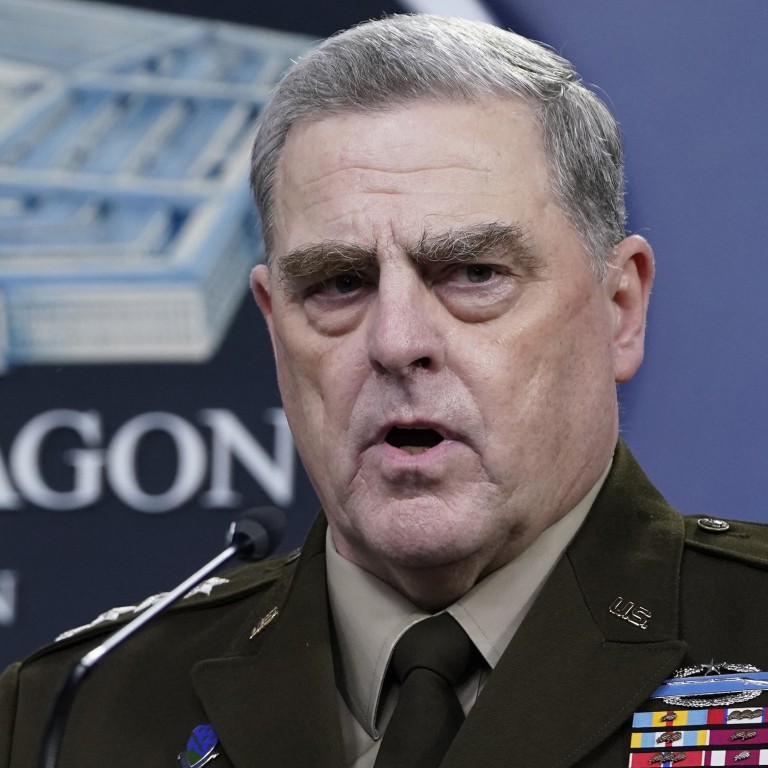
US General Milley defends calls to Chinese counterpart during Trump presidency as effort to avoid conflict
- Biden defends general while Trump calls Milley ‘a complete nutjob’ and says he ‘never told me about calls being made to China’
- Chinese military source says US activities last year led to an increase in tensions at a time there were no clear rules of engagement for the two sides
“I have great confidence in General Milley,” Biden said when asked whether Milley, chairman of the Joint Chiefs of Staff, had done the right thing.
Milley’s calls to General Li Zuocheng were described in the upcoming book Peril by Bob Woodward and Robert Costa. According to the book, Milley told Li that he would warn him in the event of a US attack.
According to a source close to the Chinese military, military tensions between the two countries flared last year, when the US sent bombers and fighters close to the coast of southern China.
After 9/11 terror attacks, China saw a strategic opportunity and took it
In a separate incident in June last year, the US sent F-18 super hornets to monitor a People’s Liberation Army electronic surveillance ship, which was sailing in international waters near the Miyako Strait.
“In the second incident, the American pilots staged several simulated nosedive attacks when flying over a PLA Type 815 spy vessel in the waters,” said the source, who requested anonymity due to the sensitivity of the matter. He added that the Chinese vessel was not heavily armed.
The two militaries had yet to build rules of engagement as almost all the channels of military-to-military communication had been cut in the Trump administration, pushing the PLA to use other communication channels to maintain contact with their American peers.
In a written statement, Milley’s spokesman, Colonel Dave Butler, said Milley acted within his authority as the most senior uniformed adviser to the president and to the secretary of defence.
“His calls with the Chinese and others in October and January were in keeping with these duties and responsibilities, conveying reassurance in order to maintain strategic stability,” Butler said.
“All calls from the chairman to his counterparts, including those reported, are staffed, coordinated and communicated with the Department of Defence and the inter-agency.”
The book by Woodward and Costa reported that Milley, fearful of Trump’s actions in his final weeks as president, twice called his Chinese counterpart to assure him that the United States was not going to attack China.
One call took place on October 30 2020, four days before the election that Trump lost. The second call was on January 8, 2021, less than two weeks before Biden’s inauguration and just two days after Trump supporters stormed the US Capitol.
Trump builds campaign operation for 2024 comeback bid
“General Li, I want to assure you that the American government is stable and everything is going to be OK,” Milley told him in the first call, according to the book. “We are not going to attack or conduct any kinetic operations against you.
“If we’re going to attack, I’m going to call you ahead of time. It’s not going to be a surprise.”
In his statement on Wednesday, Butler did not directly address this aspect of the call but said Milley regularly communicated with his counterparts across the globe, including in China and Russia, to reduce tensions, provide clarity and avoid “unintended consequences or conflict”.
On Tuesday, Trump said Milley should be tried for treason if it was true that he had promised Li that he would warn him in the event of a US attack. In a follow-up statement Wednesday, Trump called Milley “a complete nutjob” and said he “never told me about calls being made to China”.
“He put our Country in a very dangerous position but President Xi knows better, and would’ve called me,” Trump added.
Milley believed the president suffered a mental decline after the election, agreeing with a view shared by House Speaker Nancy Pelosi in a phone call they had on January 8, according to officials.
Milley also asked senior officers to swear an “oath” that Milley had to be involved if Trump gave an order to launch nuclear weapons, according to the book.
According to the book, Milley called the admiral overseeing the US Indo-Pacific Command, the military unit responsible for Asia and the Pacific region, and recommended postponing upcoming military exercises.
It is not clear what, if any, military exercises were actually postponed. But defence officials said it was more likely that the military postponed a planned operation, such as a freedom of navigation transit by a US Navy ship in the Pacific region. The defence officials spoke on condition of anonymity to discuss private conversations.
In response to the book, Senator Marco Rubio, a Florida Republican, sent Biden a letter on Tuesday urging him to fire Milley, saying the general worked to “actively undermine the sitting Commander in Chief”.
Timeline of the US-China trade war since July 2018
Relations between China and the US started to cool after Trump initiated a trade war and then worsened both countries ramped up military activities in the disputed South China Sea.
In October 2018, a Chinese destroyer nearly collided with a US warship after making what the Americans described as an “unsafe and unprofessional” manoeuvre in an attempt to warn it to leave the area.
Despite a real risk of military conflict between two countries, Liang Yunxiang, an international relations specialist from Peking University, said a large-scale war was still unlikely.
“Yes, there are some risks and frictions, and some small-scale confrontation cannot be completely ruled out, but we can largely feel reassured that there won’t be a large-scale war because both governments cannot afford the huge cost and now the top leaderships are rational,” Liang said.
Additional reporting by Associated Press


